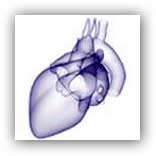|
According to a new CDC Vital Signs report, 3 out of
4 U.S. adults have a predicted heart age that is
older than their actual age. This means they are at
higher risk for heart attacks and stroke.
“Heart age” is the calculated age of a person’s
cardiovascular system based on his or her risk
factor profile. The risks include high blood
pressure, cigarette smoking, diabetes status, and
body mass index as an indicator for obesity.

This is the first study to provide population-level
estimates of heart age and to highlight disparities
in heart age nationwide. The report shows that heart
age varies by race/ethnicity, gender, region, and
other sociodemographic characteristics.
CDC researchers used risk factor data collected from
every U.S. state and information from the Framingham
Heart Study to determine that nearly 69 million
adults between the ages of 30 and 74 have a heart
age older than their actual age. That’s about the
number of people living in the 130 largest U.S.
cities combined.
Key findings in the report include:
- Overall, the average heart age for adult men is 8
years older than their chronological age, compared
to 5 years older for women.
- Although heart age exceeds chronological age for
all race/ethnic groups, it is highest among
African-American men and women (average of 11 years
older for both).
- Among both U.S. men and women, excess heart age
increases with age and decreases with greater
education and household income.
The heart age concept was created to more
effectively communicate a person’s risk of dying
from heart attack or stroke – and to show what can
be done to lower that risk. Despite the serious
national problem of higher heart age, the report’s
findings can be used on both an individual and
population level to boost heart health, particularly
among groups that are most at risk of poor
cardiovascular outcomes.
“Because so many U.S. adults don’t understand their
cardiovascular disease risk, they are missing out on
early opportunities to prevent future heart attacks
or strokes,” said Barbara A. Bowman, Ph.D., director
of CDC’s Division for Heart Disease and Stroke
Prevention. “About three in four heart attacks and
strokes are due to risk factors that increase heart
age, so it’s important to continue focusing on
efforts to improve heart health and increase access
to early and affordable detection and treatment
resources nationwide.”
For more information
CDC - Centers for Didease Control and Prevention
U.S.A.
http://www.cdc.gov/.
MDN |